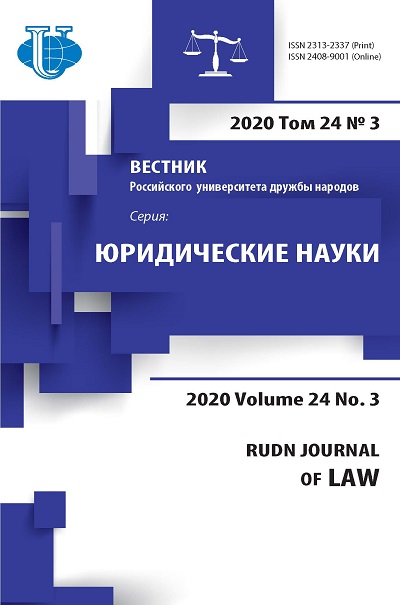HISTORICAL-LEGAL FUNDAMENTALS OF THE STATE RUSSIAN POLITICS IN XVI-XVIII CENTURIES TOWARDS ABORIGINAL PEOPLES ON THE EXAMPLE OF THE MORDVINS
- Authors: Sushkova I.N.1
-
Affiliations:
- National Research Ogarev Mordovia State University
- Issue: Vol 24, No 3 (2020)
- Pages: 591-607
- Section: HISTORICAL AND LEGAL RESEARC
- URL: https://journals.rudn.ru/law/article/view/24563
- DOI: https://doi.org/10.22363/2313-2337-2020-24-3-591-607
- ID: 24563
Cite item
Full Text
Abstract
The rationale of the study is the uniqueness of the system of the multi-national and multi-confessional Russian state. Peoples' inclusion into a single state legal framework determined the need to develop a relevant ethnic legal policy. In this regard, this paper is aimed at articulating the legal fundamentals of the Russian politics in XVI-XVIII centuries towards aboriginal peoples on the example of the Mordvins. The paper discusses the key aspects of the Mordvins’ life under the Russian law. It looks into 16th-18th centuries regulations regarding non-Russians that determined the specifics of their adaptation within Russia. The study is mainly based on the formal-legal, historical-legal methodology with emphasis on sociocultural and legal-anthropological approaches, which made it possible to historically and legally assess laws and regulations that reflect specifics of Mordvins’ position in the 16th-18th centuries. The paper has a practical value for improving the legislation for inter-ethnic relations and strengthening the foundations of federalism as the key characteristic of the Russian state.
About the authors
Iuliia N. Sushkova
National Research Ogarev Mordovia State University
Author for correspondence.
Email: yulenkam@mail.ru
Doctor of Historical Sciences, Associate Professor, Head of the International and European Law Department, Dean of the Law Faculty
68 Bolshevistskaya srt., 430005, Saransk, Russian FederationReferences
- Arsent'ev, N.M., Yurchenkov, V.A. (eds.) (2001) Istoriya Mordovii: s drevneishikh vremen do serediny XIX veka [History of Mordovia: From Ancient Times to the Mid-20th century]. Pod red. prof. N.M. Arsent'eva i prof. V.A. Yurchenkova. Saransk: Publishing House of Mordovia University Publ. (in Russian).
- Abercromby, J. (2010) The Beliefs and Religious Ceremonies of the Mordvins (Folklore History Series). Pierides Press.
- Barber, N.W. (2006) Legal Pluralism and the European Union. European Law Journal, Vol. 12, No. 3, 306–329.
- Berman, P.S. (2012) Global Legal Pluralism: A Jurisprudence of Law beyond Borders. Cambridge University Press.
- Franz and Keebet Von Benda-Beckmann (ed.) (2008) Dynamics of Plural Legal Orders: The Journal of Legal Pluralism and Unofficial Law. Ed. Franz and Keebet Von BendaBeckmann. Lit Verlag.
- Janurik, B. (2015) The emergence of gender agreement in code-switched verbal constructions in Erzya-Russian bilingual discourse. Stolz, Ch. Language Empires in Comparative Perspective. Walter de Gruyter GmbH & Co KG. 199–218.
- Grekov, B.D., Lebedev, V.I. (eds.) (1940) Dokumenty i materialy po istorii Mordovskoi ASSR [Documents and materials on the history of the Mordvinian ASSR], Ed. Institute of History Acad. sciences of the USSR; (Ed. Ed. B.D. Grekov and Prof. V.I. Lebedev); Mord. N.-i. Institute of Language, lit. and history under SNK MASSR. Saransk: MINISTRIES, 1939–1952. Vol. 1 (Part 1): V century. bc e. VIII century n e. (in Russian).
- Helfand, M.A. (2015) Negotiating State and Non-State Law: The Challenge of Global and Local Legal Pluralism. Cambridge University Press.
- Khristoforov, I. Ya. (1986) O starinnykh rukopisyakh v Simbirskoi Karamzinskoi biblioteke [On Ancient Manuscripts in the Simbirsk Karamzin Library]. Proceedings of the IV Archaeological Congress in Russia, Vol. 2. Kazan. 27–42. (in Russian).
- Kirmse, S.B. (2019) The Lawful Empire: Legal Change and Cultural Diversity in Late Tsarist Russia. Cambridge University Press.
- Kuznetsov, S.K. (1912) Russkaya istoricheskaya geografiya: Kurs lektsii, chit. v 1908–09 uch. [soch.] S.K. Kuznetsovym [Russian Historical Geography: Lecture Course, read in 1908– 09 / [Op.] S.K. Kuznetsov]. Mordva. Moscow: Pechatnya A.I. Snegireva: Type. Pozhidaeva Publ. (in Russian).
- Melnikov, P.I. (1981) Ocherki mordvy [Essays on the Mordva]. Saransk: Mordov. Publ. House. (in Russian).
- Miheeva, C.C., Trikoz, E.N., Grafshonkina, A.A. Andreeva, P.N. (2019) Review of II International Scientific Conference “Law — Phenomenon of Civilization and Culture”. Russia, Moscow, RUDN, 9–30 March 2019. Vestnik RUDN. Series: Legal Sciences. Vol. 23. № 3, 455–477. (in Russian).
- Mokshin, N.F. (1977) Etnicheskaya istoriya mordvy [Ethnic history of Mordva]. Saransk: Mordov. Publ. House. (in Russian).
- Mokshin, N.F. (2012) Mordva v istorii Rossii [Mordva in the history of Russia]. Russkaya istoriya, No. 2 (21), 38–43. (in Russian).
- Nemytina, M.V. (2017) Civilization-Cultural Approach in Legal Studies. Vestnik of the Kutafin University. № 4, 28–40. doi: 10.17803/2311-5998.2017.32.4.028-040. (in Russian).
- Provost, R., Sheppard, C. (eds.) (2013) Dialogues on Human Rights and Legal Pluralism (Ius Gentium: Comparative Perspectives on Law and Justice Book 17). Ed. René Provost, Colleen Sheppard. Edition, Kindle Edition. Springer.
- Safargaliev, M.G. (1963) K istorii tatarskogo naseleniya Mordovskoi ASSR (o misharyakh) [To the History of the Tatars of the Mordvinian ASSR (about the Mishars)]. Proceedings of the Mordovian Scientific-Research Institute of Language, Literature and History. Historical series. Issue 24. Saransk. 64–79. (in Russian).
- Sushkova, Iu.N. (2019) Obychnoe pravo mordvy [Customary Law of the Mordvins]. Saransk: Mordov. Univ. Publ. House. (in Russian).
- Taagepera, R. (2000) The Finno-Ugric Republics and the Russian State. Taylor & Francis.
- Tikhomirov, M.N., Epifanov, P.P. (1961) Sobornoe ulozhenie 1649 goda [Cathedral Code of 1649]. Moscow: Lomonosov Univ. Publish. House. (in Russian).
- Tomsinov, V.A. (2007) Sobornoe ulozhenie 1649 goda kak pamyatnik russkoi yurisprudentsii [Cathedral Code of 1649 as a Monument of Russian Law. Pravovedenie. No. 1. 162–188. (in Russian).
- Yakovlev, A.I. (ed.) (1939) Dokumenty i materialy po istorii Mordovskoi ASSR. [Documents and materials on the history of the Mordvinian ASSR]. Mordovskii nauchno-issledovatel'skii institut yazyka, literatury i istorii pri SNK MASSR; Pod red. Instituta istorii AN SSSR; Pod red. A.I. Yakovleva (nauch. red.) i dr. Tom 3. Chast' 1. Saransk: Mordgiz vol. 3. Saransk, 1939 [Mordovian Research Institute of Language, Literature and History at the SNK MASSR]; Ed. Institute of History, USSR Academy of Sciences; Ed. Yakovlev A.I. (scientific ed.) and others. Volume 3. Part 1. Saransk: Mordgiz Publ. (in Russian).
- Various (2010) Marriage Customs Among Early Mordvins, Slavs, and Manchus. Pierides Press.
Supplementary files















